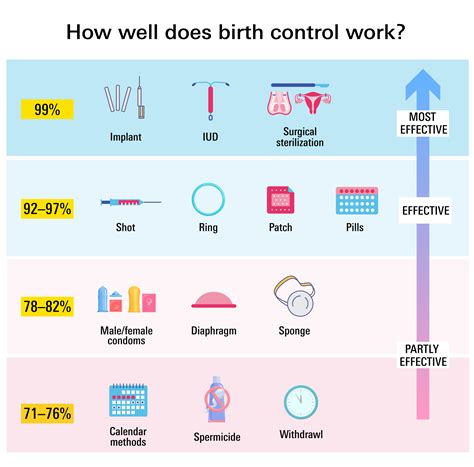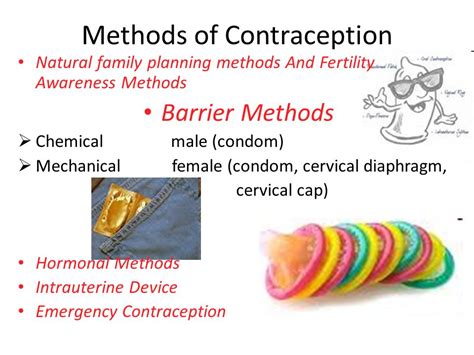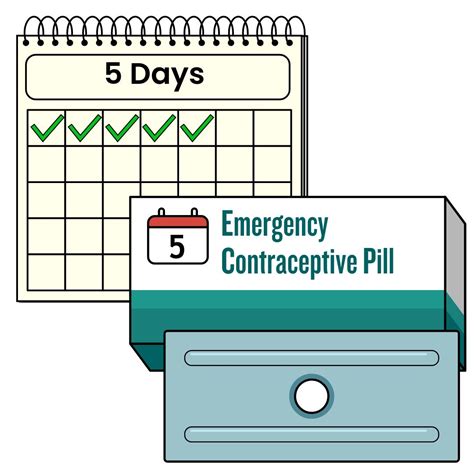Intro
Discover the reliability of birth control methods, including hormonal and non-hormonal options, to prevent pregnancy and regulate menstrual cycles, exploring effectiveness, side effects, and failure rates.
The reliability of birth control is a topic of great interest and importance for individuals and couples seeking to manage their reproductive health. Birth control methods have evolved significantly over the years, offering a wide range of options with varying degrees of effectiveness. Understanding the reliability of different birth control methods is crucial for making informed decisions about family planning and reproductive health.
The need for reliable birth control cannot be overstated. Unintended pregnancies can have significant emotional, financial, and social implications, affecting not only the individuals involved but also their families and communities. Moreover, access to effective birth control is essential for women's empowerment, education, and economic participation. By having control over their reproductive choices, women can pursue their goals and aspirations without the burden of unintended pregnancies.
The development of modern birth control methods has been a significant public health achievement, contributing to a decline in unintended pregnancies and related health complications. However, despite the advancements, there is still a need for education and awareness about the effectiveness and limitations of different birth control methods. Misconceptions and myths surrounding birth control can lead to misuse or non-use, increasing the risk of unintended pregnancies. Therefore, it is essential to provide accurate and comprehensive information about birth control reliability to support informed decision-making.
Understanding Birth Control Effectiveness

Birth control effectiveness is typically measured by the failure rate, which is the number of pregnancies per 100 women using a particular method over a year. The most effective birth control methods have failure rates of less than 1%, while less effective methods can have failure rates of 10% or higher. Factors such as proper use, consistency, and individual characteristics can influence the effectiveness of birth control methods.
Types of Birth Control Methods
Birth control methods can be broadly categorized into hormonal, barrier, and permanent methods. Hormonal methods, such as the pill, patch, and ring, work by regulating ovulation and thickening cervical mucus to prevent sperm from reaching the egg. Barrier methods, including condoms and diaphragms, physically prevent sperm from entering the uterus. Permanent methods, such as tubal ligation and vasectomy, involve surgical procedures to prevent pregnancy.Hormonal Birth Control Methods

Hormonal birth control methods are among the most effective forms of birth control, with failure rates ranging from 0.1% to 9%. The combined oral contraceptive pill, which contains both estrogen and progestin, is one of the most popular hormonal methods. Other hormonal methods include the patch, ring, and injectable contraceptives. These methods are highly effective when used correctly, but their effectiveness can be compromised by factors such as missed doses or improper use.
Benefits and Risks of Hormonal Birth Control
Hormonal birth control methods offer several benefits, including regulating menstrual cycles, reducing menstrual cramps, and decreasing the risk of ovarian and endometrial cancers. However, hormonal methods can also have risks and side effects, such as blood clots, breast tenderness, and mood changes. It is essential to discuss the potential benefits and risks with a healthcare provider to determine the most suitable hormonal method.Barrier Birth Control Methods

Barrier birth control methods, including condoms and diaphragms, physically prevent sperm from entering the uterus. These methods are less effective than hormonal methods, with failure rates ranging from 10% to 28%. However, barrier methods have the advantage of being easily accessible, inexpensive, and free from hormonal side effects. Condoms also provide protection against sexually transmitted infections (STIs), making them a popular choice for individuals who are sexually active.
Proper Use of Barrier Methods
To maximize the effectiveness of barrier methods, it is crucial to use them correctly. This includes using condoms consistently and correctly, ensuring that the diaphragm is properly fitted and inserted, and using spermicides as directed. Improper use or inconsistent use can significantly increase the risk of pregnancy.Permanent Birth Control Methods

Permanent birth control methods, such as tubal ligation and vasectomy, involve surgical procedures to prevent pregnancy. These methods are highly effective, with failure rates of less than 1%. However, they are considered permanent and should be carefully considered before making a decision. Permanent methods are typically recommended for individuals who have completed their families or are certain that they do not want to become pregnant in the future.
Considerations for Permanent Methods
Before undergoing a permanent birth control procedure, it is essential to consider the potential risks and benefits. These methods are generally safe, but they can have complications, such as infection, bleeding, or reaction to anesthesia. Additionally, permanent methods are not reversible, so it is crucial to be certain about the decision before proceeding.Natural Family Planning Methods

Natural family planning methods, also known as fertility awareness-based methods, involve tracking the menstrual cycle to predict fertile days. These methods can be effective, but they require careful tracking and discipline. Natural family planning methods include the rhythm method, basal body temperature method, and cervical mucus method. While these methods can be appealing to individuals who prefer a non-hormonal approach, they have higher failure rates compared to other birth control methods.
Effectiveness of Natural Family Planning
The effectiveness of natural family planning methods depends on the individual's ability to accurately track their menstrual cycle and fertile days. With proper use, natural family planning methods can have failure rates ranging from 1% to 23%. However, these methods can be challenging to use correctly, and inconsistent use can increase the risk of pregnancy.Emergency Contraception

Emergency contraception, also known as the morning-after pill, is a type of birth control that can be used after unprotected sex to prevent pregnancy. Emergency contraception is available in several forms, including levonorgestrel and ulipristal acetate. These methods can be effective in preventing pregnancy if used within a few days of unprotected sex. However, emergency contraception is not a substitute for regular birth control and should only be used in emergency situations.
Accessibility and Effectiveness of Emergency Contraception
Emergency contraception is widely available over-the-counter or by prescription, depending on the type and location. The effectiveness of emergency contraception depends on the timing and type of method used. Levonorgestrel, for example, is most effective when used within 72 hours of unprotected sex, while ulipristal acetate can be effective up to 120 hours after unprotected sex.What is the most effective birth control method?
+The most effective birth control methods are hormonal methods, such as the pill, patch, and ring, which have failure rates of less than 1%. However, the effectiveness of any birth control method depends on proper use and individual factors.
Can I use birth control to regulate my menstrual cycle?
+Yes, hormonal birth control methods can help regulate menstrual cycles and reduce menstrual cramps. However, it is essential to discuss the potential benefits and risks with a healthcare provider to determine the most suitable method.
Is it safe to use birth control while breastfeeding?
+Some birth control methods, such as hormonal methods, may not be suitable for breastfeeding women. It is essential to consult with a healthcare provider to determine the most suitable birth control method while breastfeeding.
In conclusion, the reliability of birth control methods is a critical aspect of reproductive health. By understanding the effectiveness, benefits, and risks of different birth control methods, individuals can make informed decisions about their reproductive choices. Whether using hormonal, barrier, or permanent methods, it is essential to follow proper use guidelines and consult with a healthcare provider to ensure the most effective and safe birth control experience. We invite you to share your thoughts and questions about birth control reliability in the comments section below. Your input can help others make informed decisions about their reproductive health. Additionally, if you found this article helpful, please share it with others who may benefit from this information.
